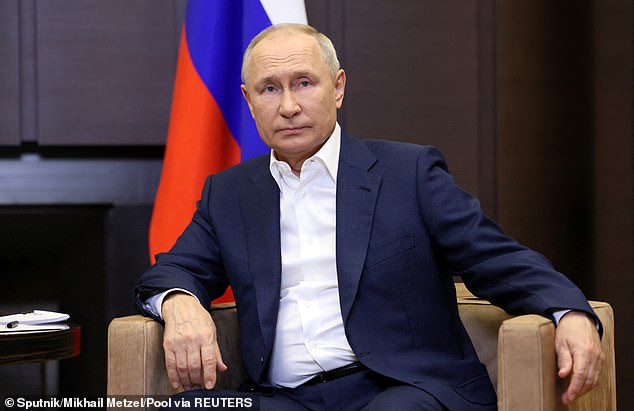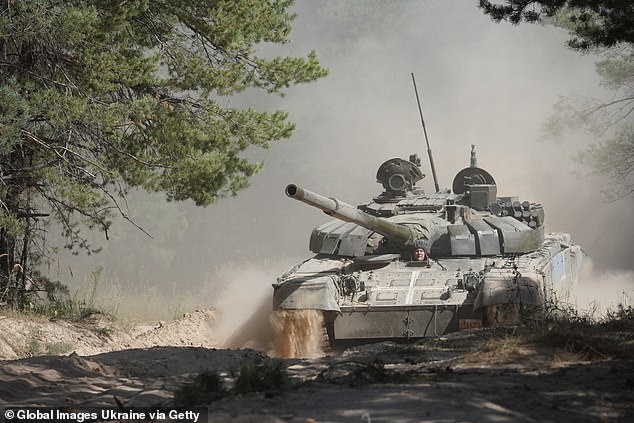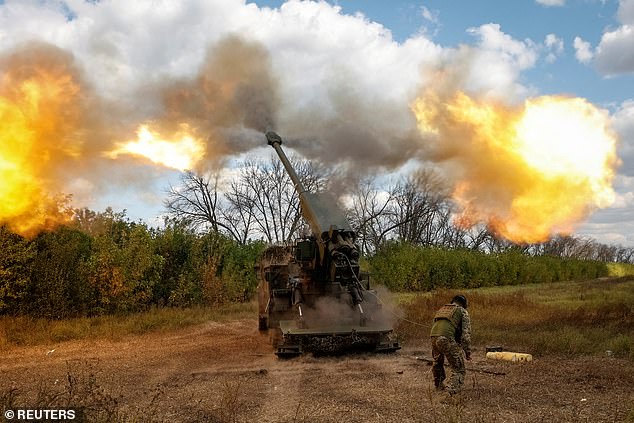Putin ‘censors reports of second mass mobilisation of reserve soldiers to avoid causing widespread panic’
Russia is reportedly trying to censor media reporting of a rumored second mass mobilization of reserve forces to stamp out discontent ahead of next year’s presidential elections.
The pro-Kremlin media has reportedly received a memo containing guidelines and an “urgent request” to downplay speculation that Russia is about to call up more reservists to trigger its brutal invasion of Ukraine.
Opposition channel Meduza yesterday claimed to have seen the guidelines, shared by employees working for state-controlled media. One of them reportedly told the publication: ‘Everyone knows that if the government denies that something is going to happen, it will definitely happen.’
The memo allegedly told pro-Kremlin outlets to focus instead on reporting on contract recruitment for the military.
Russia has stepped up its efforts this year to censor dissident voices. Only on Thursday, Duma deputy Anton Gorelkin said that Russia should consider blocking WhatsApp in Russia if the app launches Russian-language channels.
State censor Roskomnadzor added that Russia could block WhatsApp if it spreads banned information as the application prepares to launch a channel feature with more than 150 countries, likely including Russia.
A Russian reservist says goodbye to family members before leaving for a base for partial mobilization of troops, in Gatchina, Russia, on October 1, 2022

Vladimir Putin attends a meeting with Belarusian President Alexander Lukashenko in Sochi, Russia on September 15, 2023. Putin is seeking re-election in the 2024 presidential election
Rumors of a second call-up of reserves have piled up ahead of the start of the six-month conscription cycle on October 1.
Earlier this month, a fake photo of a signed mobilization order caused a stir on Russian social media.
Media insiders reportedly told Meduza that they had been instructed to refrain from any discussion of the incident – and even to avoid refuting fake news.
But fearful rumors of a new impending mass mobilization order continue to circulate online.
A Russian Telegram channel claiming ties to Russian security sources declared earlier this week that officials wanted to recruit about 170,000 to 175,000 troops in the next cycle.
Officials also reportedly hope to move the start of conscription to November 1 to allow for new mobilization processes, while recruiting 130,000 soldiers through coercive “contract mobilization.”
The Institute for the Study of War assessed However, on Tuesday top officials said they “actively disagree on the need for and preparations for a second wave of reserve mobilization.”
But speculation is unlikely to help Putin’s popularity ahead of the upcoming 2024 elections, Meduza noticed.
It ruled: “The Kremlin’s intention… is to re-elect the incumbent president with record unanimity: the aim is to get at least 80 percent of the vote with a turnout of 70 percent or more.”
Members of the State Duma and the Federation Council went so far as to propose blocking WhatsApp in an effort to control online content and restrict access to banned information.
Following Meta’s decision to launch a channel feature to more than 150 countries, likely including Russia, Russian officials proposed a complete ban on the application.
Politician and journalist Alexander Khinshtein wrote on Telegram on Thursday: “I share the position of my colleague (Deputy of the State Duma Anton) Gorelkin: if What’s App (sic) really launches Russian-language information channels, it would be right to change the attitude towards this messenger, even to the point of blocking it.
“There is no doubt about the anti-Russian nature of these channels, as WhatsApp is owned by the extremist company Meta, with all the consequences that entails.”
Meta, the parent company of WhatsApp, Instagram and Facebook, was designated as an extremist organization in March 2022.
The products have since been banned in Russia.

Lieutenant General Serhii Naiev, commander of the Joint Forces of the Armed Forces of Ukraine, pilots a captured Russian T72B3 tank during military exercises on September 8

A Ukrainian soldier fires a 2S22 Bohdana self-propelled howitzer at Russian troops, amid the Russian attack on Ukraine, at a position in the Donetsk region, Ukraine, September 13, 2023
Russia’s presidential election is scheduled for March 2024, with the winner inaugurated next May.
Putin has not yet confirmed whether he will run again.
Kremlin spokesman Dmitry Peskov said on Monday: “The president has not yet announced that he will present his candidacy.
“But if we assume that the president runs, then it is clear that at this current stage there can be no real competition for the president,” Peskov told RBC.
